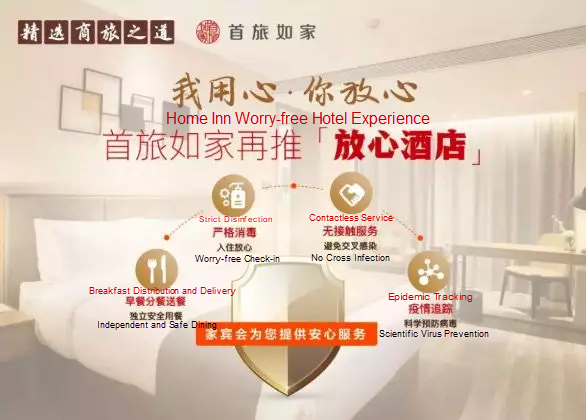In order to win this inevitable battle and fight against COVID-19, we must work together and share our experiences around the world. Join us in the fight against the outbreak through the Global MediXchange for Combating COVID-19 (GMCC) program. Apply now at https://covid-19.alibabacloud.com/
By retailmaster.
After the COVID-19 epidemic erupted, the entire retail industry faced severe challenges including zero foot traffic, liquidity crises, supply chain disruption, shortage of frontline employees, and difficulty in managing organizations. According to preliminary estimates from the global consulting firm Kearney, the COVID-19 epidemic will create an economic loss of RMB 1.5 to 3 trillion for the retail and catering industries in the first quarter of 2020. While many retail enterprises are struggling against the tide, some enterprises can lead in the face of adversity and find a new path. Peng Jianzhen, the secretary general of China Chain-Store & Franchise Association (CCFA), said: "Any big social event is a crisis for some enterprises but an opportunity for others. If enterprises can explore new business models based on the consumption behavior and psychology changes of consumers, they can embrace new opportunities."

Peng Jianzhen, the secretary general of CCFA
As people stay at home due to COVID-19, their requirements are shifted from offline to online, and more and more consumers will choose and adapt to the digital lifestyles and work methods. The profound transformation of consumers' behavior from offline to online is forcing enterprises to improve their levels of informatization and digitalization. Accordingly, enterprises need to accelerate the digital transformation of their business and organization operating models. A digital and intelligent revolution is taking place, and all industries are actively adopting innovations to turn crisis into opportunity. Peng Jianzhen asserts that the COVID-19 epidemic will accelerate the digital and intelligent transformation of the Chinese retail industry.
In all industries, those who embraced full-channel marketing and digital transformation have performed exceptionally well during the COVID-19 epidemic. For example, the hotel industry has been severely impacted by the epidemic. Most hotel enterprises have had trouble confronting these challenges. However, Home Inn quickly established an emergency mechanism at the beginning of the epidemic and used information drawn from consumer analysis, psychological insights, and the intelligent service system to develop and provide contactless services, quarantine rooms, and worry-free hotels. It also provided artificial intelligence (AI) devices, such as sales robots and self-service check-in to help guests check in without worrying about exposure to contagion.

Wang Bo, the senior vice president of Home Inn, believes that contactless services are important to consumers due to the impact of the epidemic, and that such services will become a trend in the entire service industry. To provide contactless services, enterprises must build a consumer-based one-stop digital operation platform, create extensive scenario solutions, and use the business mid-end, data mid-end, and store apps to provide contactless services for consumers. In short, the digital transformation of the hotel industry is imperative.
"The current situation is forcing the whole industry to promote online door-to-door businesses", said Peng Jianzhen. Quarantine changes consumers' lifestyles and consumption habits and accelerates online business development and innovation. Online door-to-door businesses increased rapidly, especially in the catering industry. Due to the epidemic, a large number of food and beverage stores had to shut down their stores and expand their takeout businesses to keep their heads above water. Among the affected enterprises, Ele.me has launched the contactless and worry-free delivery service in China and jointly launched the takeout "confidence card" along with many catering brands. This helps ease consumers' worries about takeout and the whole food and beverage industry.

Wang Xi, a co-founder of 51WM, said, "Offline passenger flow cannot be restored in a short time. The changes to dining scenarios due to the epidemic will urge catering enterprises to provide online businesses." During the epidemic, 51WM provided a quick store opening service for catering businesses, helping many catering enterprises survive the war against the epidemic.
Wang Xi also predicted that these changes to dining scenarios during the epidemic will be extended in the future because consumers' online consumption habits become irreversible once they have been formed. With increasing demand for dining at home and at the office, takeout will become one of the fiercest battlegrounds of for catering enterprises. Against this backdrop, tools that use cloud technologies, such as face scan payment, integrated operations and marketing, smart stores, smart restaurants, and transparent kitchens, will help catering enterprises enrich their consumption scenarios, implement refined operations of takeout business, and quickly provide products for consumers online.
Peng Jianzhen also stressed that, "Enterprises with strong digital capabilities can easily seize the opportunities brought by consumer behavior changes to meet consumers' explosive demands for door-to-door and online businesses."
Peng Jianzhen also found that the epidemic exposed the long-standing problems of instability of supply chains and uneven allocation of transportation capacity in the retail industry. During the epidemic, enterprises that had a robust supply chain and a sound supply chain layout performed better than those that did not. To cope with frequent fluctuations in the sales volume, demanding preservation requirements, complex supply routes, a huge logistics network, and complex and difficult control of fast-moving dairy products, Mengniu Dairy used Alibaba Cloud Data Mid-End (DME) to build a smart supply chain platform and a smart milk source platform. With the technical support of Alibaba Cloud, Mengniu Dairy has undergone in-depth intelligent transformation and comprehensively improved their sales, production arrangement, and logistics efficiency. This initiative paid off during the epidemic.
When Mengniu Dairy factories in Hubei province stopped operating due the epidemic, the Mengniu Dairy industrial park at Maanshan, Anhui province, 520 kilometers away from Hubei, became the alternative base for the Hubei market. To protect the "nutrition line" to the epidemic area, Mengniu Dairy used DingTalk to implement employees' health management, work communication, and remote dispatch. They also quickly built an efficient supply chain network to implement rapid cargo dispatching and logistics, ensuring the continuity of goods supply to Hubei. In Peng Jianzhen's opinion, the supply chain is critical for the linked retail industry. "Enterprises must pay special attention to the construction of the supply chain, including supply chain digitization, maturity, and stability. These are the key factors for physical enterprises to win both online and offline markets in the future."

Ruan Qunkun, the CIO of Liby Group, stressed that in the digital era, it is impossible for an enterprise to cover all markets with one action. So, enterprises must strengthen their ability for cross-organizational collaboration. In the current technical environment, enterprises need to shift their development model from the competition model to the symbiosis model. They must use innovation to drive growth rather than investments.
Liby Group has realized that enterprises' operations model is profoundly changing from the chain-based business operation of the process era to the network collaboration of the user-centered digital era. Based on the data capabilities of DingTalk and Alibaba Cloud, Liby has found a secret weapon for digital and intelligent transformation. Through the online operations of organization, communication, collaboration, businesses, and ecosystem, Liby promotes digital collaboration between between people and objects, between people and people, and between people and events, comprehensively improving collaboration capabilities. This organizational digital upgrade enables Liby to adapt more quickly to market changes.

Liby also attaches great importance to the use of data for enterprise development. Data has become a new engine to drive the entire business. As early as 2017, Liby started to build a data mid-end. Through data empowerment by Alibaba Cloud and other third-party service institutions, Liby improved the production efficiency and marketing strategy in terms of potential customer exploration, intelligent media determination, budget allocation, intelligent monitoring and broadcasting, and effectiveness evaluation. These types of data analysis help Liby grasp opportunities as soon as they appear.
In Ruan Qunkun's opinion, the epidemic greatly accelerated the transformation of business based on digital technologies. "We had expected a window of two to three years for this business transformation, but obviously the epidemic entirely changed the timeline. The first batch of enterprises that have completed digital and intelligent transformation have become pioneers in this epidemic. They adopted digital capabilities to quickly empower their businesses to adjust and upgrade, and as a result, they enjoy the commercial benefits brought by digital technologies." At this moment and in the future, full digitalization is the core competitiveness of enterprises. Peng Jianzhen firmly believes that digital and intelligent transformation is the trend for enterprises. This process can help enterprises explore more sales channels and online sales potential, and find systems and AI technologies that are suitable to replace human labor. In this way, enterprises can use various means to improve operational efficiency and profitability, implement lean operations, control costs, and expand unmanned scenarios.
As the epidemic winds down, the Chinese retail industry, which has worked together to wade through the difficulties, is also exploring new business opportunities. Alibaba Cloud joined forces with seven industries and dozens of industry experts to establish a "New Retail Campaign". The campaign aims to address urgent needs for core enterprise customers, share new marketing skills, and find ways to fight against this epidemic. By reviewing success stories from different industries, we have found that enterprises such as Mengniu Dairy, Home Inn, Liby, and Ele.me, that have implemented long-term digital and intelligent transformation, all experienced technology-driven advantages in their response speeds, scheduling capabilities, operational flexibility, and mobilization capabilities during the epidemic. This allowed them to better grasp this transformative window and find the market opportunities in the midst of the crisis. Not only can these companies better cope with supply chain challenges and achieve development in difficult times, but they can also quickly adjust their operating models and respond to and solve emerging new problems effectively and flexibly based on their accumulated long-term experience, protecting themselves during unpredictable times.
This epidemic crisis accelerates business failure, business evolution, and the offline-to-online new retail revolution. In the future, the Chinese retail industry will become more diverse, and the industry will be reshuffled. Only enterprises that upgrade themselves and strengthen their technical capabilities will be able to survive and succeed.
Consumers' patterns of behavior were already changing, even without the epidemic. Industries have reached a consensus on accelerating digital and intelligent transformation to meet their consumers' psychological and behavioral changes. Digital and intelligent transformation is not only significant for surviving this epidemic, but is also crucial to the long-term development of the whole industry.
See the original Chinese article.
While continuing to wage war against the worldwide outbreak, Alibaba Cloud will play its part and will do all it can to help others in their battles with the coronavirus. Learn how we can support your business continuity at https://www.alibabacloud.com/campaign/fight-coronavirus-covid-19

2,599 posts | 764 followers
FollowAlibaba Clouder - March 5, 2020
Alibaba Clouder - April 23, 2020
Alibaba Clouder - April 13, 2020
Alibaba Clouder - April 9, 2020
Alibaba Clouder - April 16, 2020
Alibaba Clouder - March 23, 2020

2,599 posts | 764 followers
Follow MaxCompute
MaxCompute
Conduct large-scale data warehousing with MaxCompute
Learn More DataV
DataV
A powerful and accessible data visualization tool
Learn More Container Service for Kubernetes
Container Service for Kubernetes
Alibaba Cloud Container Service for Kubernetes is a fully managed cloud container management service that supports native Kubernetes and integrates with other Alibaba Cloud products.
Learn MoreMore Posts by Alibaba Clouder